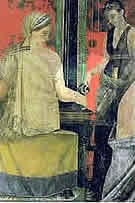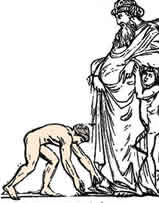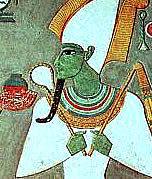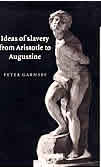| |||||||||||||||||||||||||||||||||
| Facts > Pagan Ideas > Slavery | ||||
|
|
Slavery |
 
Masters, provide your slaves
with what is right and fair... The facts being similar—everybody
had the idea—our explanation of how Christianity got the idea
of slavery shouldn't be different from our explanation of how Christianity
got the idea of a God who gives good people happiness in heaven. |
| Was Christianity new? Was Christianity unique? Let's talk about slavery. In ancient Mediterranean cultures people could be property. Babylonians, Assyrians, Sumerians, Persians, Thracian, Egyptians, Romans, Greeks all owned slaves. Jews owned slaves. God told them that
was OK. |
| Reasons preview |
|
Where did Christianity get the idea of
slavery? Do you think Christianity developed the idea of slavery all on its
own? Or did Christianity borrow—absorb—the idea from the
culture around it?
|
|
I'm guessing you already know ancient Pagans bought and sold and owned people. Rather than repeat a few drops of the ocean of primary evidence, I'll link you to Wiedemann's Greek and Roman Slavery, a well organized sourcebook with 250 pages of slave-related ancient writing. You'll find links to other books at the bottom of this page. I'll blue box just a few ancient sources. |
|
Here's Herodotus, a Greek, writing about the Persian's capture of the Greek cities in Ionia (aka Turkey) earlier in his fifth century BC. Persia captured the city of Miletus. They made the folks who lived there into slaves. You had to figure this was going to happen. The God Apollo had prophesied it exactly, though his oracle at Delphi. |
|
Gods, speaking through their prophets, told people the future. The ancients set up prophecy centers, called oracles, where priests or priestesses were possessed by the God—think "filled with the Holy Spirit"—and spoke His prophetic words. The most famous oracle was at Delphi, in Greece. It was there that God Apollo's priestess gave the God's prophesy about Miletus |
6. 19. For once upon a time, when the Argives had sent to Delphi to consult the god about the safety of their own city, a prophecy was given them, in which others besides themselves were interested; for while it bore in part upon the fortunes of Argos, it touched in a byclause the fate of the men of Miletus. I shall set down the portion which concerned the Argives when I come to that part of my history, mentioning at present only the passage in which the absent Milesians were spoken of. This passage was as follows: |
| The God's words were written down. |
Then shalt thou, Miletus, so
oft the contriver of evil, |
| And sure
enough, it happened. |
Such a fate now befell the Milesians; for the Persians, who wore their hair long, after killing most of the men, made the women and children slaves; and the sanctuary at Didyma, the oracle no less than the tem- [page 346] ple, was plundered and burnt; of the riches whereof I have made frequent mention in other parts of my history. |
| Herodotus, The Persian Wars, 6.18- 19 (c 440 BC), -- which you can find in: Godolpin, Francis. The Greek Historians (1942), pg. 345- 6] |
The ancient pagans owned slaves. You've read it yourself, in the words of the ancients.
|
Another time, says Herodotus, the Getae opposed the Persian King Darius, on account of which they were made slaves.
|
|
You know which Getae, right? I mean the Getae whose God told them they were immortal. They had eternal life. After they died, they went to live forever with God, aka Zalmoxis. Those Getae. |
94. The belief of the Getae in respect of immortality is the following. They think that they do not really die, but that when they depart this life they go to Zalmoxis, who is called also Gebeleizis by some among them. |
| Herodotus, The Persian Wars, 6.18- 19 (c 440 BC), -- which you can find in: Godolpin, Francis. The Greek Historians (1942),, pg. 259- 60] |
The ancient pagans owned slaves. You've read it yourself, in the words of the ancients. |
The ancient pagans owned slaves. You've read it yourself, in the words of the ancients. |
Early Christian sources confirm Roman slavery. Here's "Luke," the unknown author of the New Testament book Acts, describing the apostle Paul's contact with a young Roman slave girl, and the spirit that lived inside her, and gave her the power of prophesy. Foretelling the future, with the help of this spirit, is how the little girl made money for her owner.
Paul cast out the pagan spirit with the power to foretell the future, and the slave girl's owner got mad. Like Paul, the pagan Roman knew all about spirits and their power of prophesy. |
|
The ancient pagans owned slaves. You've read it yourself, in the words of the ancients. |
|
Back to the beginnings of their religion, say their sacred scriptures, Jews were slave masters. But the Old Testament doesn't just record Jewish slave owning in archaic tribal legends, your bible also records detailed instructions, dictated by God, about owning slaves the right way. |
Ancient Jews were slave masters. You've read it yourself in the holy word of God. |
|
The first Christians were instructed by God how to be slave masters. |
|
Here's a passage from the holy word of God, written by Paul the apostle. Paul, you remember, spent a lot of time filled with the Holy Spirit of God, which is where Paul learned about Jesus and what Jesus expected. What Jesus expected was that Christians would be slave masters. But you'd better be right and fair about it! Don't make me come down there! |
|
Like the Pagans, like the Jews, the first Christians were slave masters.
|
| And, said God through Paul His apostle, Christian slaves were to obey their masters.
Like the Pagans, like the Jews, the first Christians were slave masters. |
|
Slaves obey your masters. |
|
Again more instructions in the holy word of God about how to be a slave master the right way—teach slaves to be subject to their masters in everything.
Like the Pagans, like the Jews, the first Christians were slave masters |
|
And the holy word of God explicitly says, do not stop slavery. Every person must stay in the situation they are in. Including slaves. That's how Jesus wants it.
|
|
Like the Pagans, like the Jews, the first Christians were slave masters |
The
First Christians' Slavery was Different from Pagan and Jewish
Slavery |
For our purposes, it's enough to know that Pagan and Christian ideas about slavery were different. |
|
In case you're interested in Paul's metaphorical theories about slavery, here's a smattering. >>
|
Galatians 3 Romans 7 |
Those are the facts. In ancient Mediterranean cultures people could be property. Babylonians, Assyrians, Sumerians, Persians, Thracian, Egyptians, Romans, Greeks all owned slaves. Jews owned slaves.
God told them that was OK. |
|
Good Books for this section
| Greek &
Roman Slavery
|
What you'll find:
An excellent source of primary material.
|
| |
| Ideas of
Slavery from Aristotle to Augustine
|
What you'll find:
|
| |
|
|
 In
this Facts section of POCM I'm not allowed to talk about Reasons. That
doesn't mean you can't think about what the facts mean. As you read
the facts about ancient Pagan and Christian slavery, think about this
question...
In
this Facts section of POCM I'm not allowed to talk about Reasons. That
doesn't mean you can't think about what the facts mean. As you read
the facts about ancient Pagan and Christian slavery, think about this
question... Pagan
Slavery
Pagan
Slavery
 Acts
Chapter 16
Acts
Chapter 16 The
twin concepts of good slavery and bad slavery
are both well-developed in Paul.
The
twin concepts of good slavery and bad slavery
are both well-developed in Paul.